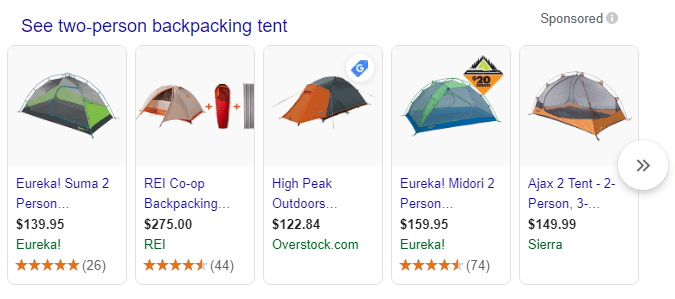Why isn’t my website showing up on Google? It’s a common question many of us ask ourselves when we search for our keywords, and our website is nowhere to be seen in the search results.
There could be a variety of problems that causes your website to now show up on Google. But the good news is that are plenty of fixes that can get your website up to the top of the search results.
On this page, we’re exploring the top issues preventing your website from showing up on Google and how to fix them! So keep reading!
Learn how we increased traffic by over40%, and conversions by over100%for an ecommerce client.
Read the Case Study

A quick note before we dive in
If you recently created the page or requested it to be indexed, it can take Google some time to index your page. Allow at least a week after submitting a request to Google to index your page or submitting yoursitemapbefore assuming there is an issue with your site ranking on Google.
SEO Pricing: How Much Does SEO Cost in 2023?
Discover how much SEO costs, and why, in this free guide written by our expert team.
Download PDF
7 reasons why your site isn’t showing up on Google (+How to fix poor rankings)
There are a number of factors that can influence why you’re asking yourself the question, “why can’t I find my website on Google?”
Here are 10 reasons why your website is not showing up on Google or why it’s ranking so low that it’s not visible in the search results and how you can fix it.
- Your website is too new
- Your website contains “no index” tags
- Google isn’t crawling your website
- Your website has a penalty
- You’re lacking high-quality backlinks
- Your keywords are too competitive
- Your website doesn’t provide a good user experience (UX)
1. Your website is too new
It can take some time for Google to discover brand-new websites and pages. So, if you only just launched your website or page, the simplest reason your website is missing from the search results is that Google hasn’t discovered your site or page yet.
To check whether Google has discovered your website or page, you can run the following search on Google:site:yourwebsite.com.

If you’re looking to see if Google knows about a specific page, you can type in the full URL of the page:site:yourwebsite.com/blog/the-page-im-looking-for/

If you see at least one result, that means Google knows about your page! If you don’t see any results, this means Google hasn’t found your webpage or site yet.
How to fix it
If you see no results when you search for your site on Google, you can create and submit a sitemap onGoogle Search Console. Creating a sitemap lets Google know which pages on your site are important and where they are located.
To create and submit a sitemap to Google, follow these steps:
- Log in to Google Search Console
- Navigate to Sitemaps
- Enter sitemap URL
- Click Submit

2. Your website contains “no index” tags
A “no index” meta tag is a piece ofHTML codethat tells Google not to show certain pages in the search results. As a result, Google won’t index any pages with this code.
It’s usually a good idea to check that your page doesn’t have the “no index” meta tag, even if you don’t remember including it.
SometimesWordPressor othercontent management systems (CMS)will add it to every page if you check the wrong settings when creating your website.
Additionally, your developer may use a “no index” code to prevent Google from ranking pages that are still in the development process and may forget to remove the tag once the page is complete.
How to fix it
Use Google Search Console to easily identify any “no index” tagged pages. Navigate to yourCoveragereport and look for this error: “submitted URL marked ‘noindex’.”
If Google hasn’t crawled the pages in your sitemap yet, (remember this can take time), you can useAhrefs Site Audittool to check your site for any “no index” meta tags.
Once you’ve located all the pages with this tag, you can simply remove it from any pages that shouldn’t have it.
3. Google isn’t crawling your website
Another reason your site is not showing up on Google could be that something is blocking the search engine from crawling your site.
The majority of websites have a “robots.txt” file. It tells search engines where they can’t go on your site. That means Google won’t be able to crawl any URLs that are blocked in your “robots.txt” file.
How to fix it
Google Search Console can alert you about issues related to a “robots.txt” file. Navigate to yourCoveragereport and look for an error called “submitted URL blocks by robots.txt.”
Now, all you need to do is remove any directives that are blocking the URLs you want to show up on Google. It’s important to note, however, that “robots.txt” files can get tricky, so if you’re in doubt about how best to navigate them, it’s a good idea to hire an expert, like WebFX, to fix it.
4. Your website has a penalty
惩罚也可以防止你的网站排名in Google search results. This can resolve your burning question, “why doesn’t my website show up on Google” if your site isn’t new and has a proper robots.txt file.
If your site doesn’t meet Google’s quality guidelines, it may temporarily or permanently remove your site from search results.
Google penaltiesinclude:
- Deindexed:Google completely removes your domain from search results.
- Penalized:Your domain still exists, but you can’t find your pages via a direct search. This penalty may result from a Google algorithm update, or Google can manually apply it.
- Sandboxed:Your Google traffic drops suddenly, but your domain wasn’t Deindexed or Penalized.
How to fix it
Check Google Search Console for penalty alerts. If your site gets penalized, you’ll need to take steps to modify your website to meet Google’s guidelines. Then, you cansubmit your site for reconsiderationto get back on Google.
5. You’re lacking high-quality backlinks
If you’re searching “my website doesn’t show up on Google,” you might need to gain more high-quality backlinks.
Google considershundreds of ranking factorswhen determining which websites should show up in the search results, one of which is backlinks and authority.
Backlinks from other websites to your website show Google that your page is trustworthy and provides value. If your site’s not showing up on Google, it could be because the websites ranking above you have more backlinks.
How to fix it
Use a tool likeAhrefsto view your page’s backlinks and compare it to other websites in the search results. If your website is falling short, consider building more backlinks.
Here are a few tips to earn more backlinks:
- Ask existing partners for backlinks
- Ask people that mention your brand on social media to link to your website
- Create helpful, valuable content that people want to link to
- Participate in forums, interviews, and blogs and provide a link to your website where relevant
6. Your keywords are too competitive
如果你正在读这篇文章,想:“我的合同ent’s great, and my website still isn’t showing up on Google,” then it’s time torevisit your keyword targeting.
Trying to rank for highly-competitive results, especially when competing with bigger brands, can sometimes leave your business in the dust. Instead, consider targeting long-tail, more specific phrases that contain three or more keywords.
Whilelong-tail keywordshave lower monthly search volumes, they are also less competitive, giving you a better chance of ranking at the top of search results. In addition, long-tail keywords typically have a more specific search intent.
For example, if someone searches a generic keyword like “tent,” it’s hard to determine exactly what they want to find.
Do they want to know how to set up a tent? Are they researching the best tent for their next camping trip? Do they want to buy a specific type of tent?
On the other hand, if someone searches the long-tail phrase, “buy two-person backpacking tent,” you know that they’re ready to purchase.

Companies that sell outdoor gear will have an easier time ranking for the long-tail phrase “buy two-person backpacking tent,” and they can create content that matches that specific intent.
How to fix it
Successful SEO campaigns always start withkeyword research. Using tools likeKeyword Tool,KeywordsFX, andGoogle’s Keyword Planner, try to identify long-tail keywords with less competition that offer the most value to your business.
Targeting less competitive phrases will allow you to show up in Google results and reach more customers online.
7. Your website doesn’t provide a good user experience (UX)
Finally, if your website delivers apoor user experience (UX), you can kiss top rankings goodbye. Search engines want to rank valuable content and websites that provide visitors with a greatpage experience.
If users don’t have a positive experience on your website, they’ll waste no time hitting the back button — a signal to Google that your site shouldn’t rank.
Improving UX on your site canreduce bounce rates, engage visitors, and help them learn more about your business, all while helping you rank higher in search results.
How to fix it
A few quick fixes can take your UX and site rankings to new heights. To improve your site’s UX, you can:
- Speed up your site’s load time withpage speed optimization services
- Streamline your site’s navigationto make it easy to find information
- Includevisual elementsto break up content and engage visitors
For more info on improving your site’s UX, check out ouruser experience analysis services.
Independent research from Clutch has named WebFX the
top SEO companyin the United States.
Clutch has personally interviewed more than 250 WebFX clients to discuss their experience partnering with us.
Read More Clutch Reviews

Improve your site’s rankings on Google with WebFX
Need help getting your website on Google and boosting your rankings? WebFX can help with that!
When you partner with ourSEO agency, you’ll receive personalized SEO strategies tailored to your unique company and access to a team of SEO experts who’ve driven more than$3 billion in client revenue.
Contact us onlineor call us at888-601-5359to learn more about our customSEO services!
Table of Contents
- A Quick Note Before We Dive in
- 7 Reasons Why Your Site Isn’t Showing Up on Google (+How to Fix Poor Rankings)
- 1. Your Website is Too New
- 2. Your Website Contains “no Index” Tags
- 3. Google Isn’t Crawling Your Website
- 4. Your Website Has a Penalty
- 5. You’re Lacking High-quality Backlinks
- 6. Your Keywords Are Too Competitive
- 7. Your Website Doesn’t Provide a Good User Experience (UX)
- Improve Your Site’s Rankings on Google with WebFX
Related Resources
- Need Help with SEO? 6 Ways to Improve SEO for Google
- How to Submit URLs to Google in 60 Seconds or Less
- 3 Latest Google Updates That’ll Affect Your SEO Strategy
- 5 Valuable Ways to Use Google Search Trends for SEO
- Google Discover: Harnessing the Power of Google Discover Feed for SEO
- 7 Ways Google Measures the Quality of Search Results
- How to Get to the Top of Google Search Results
- Google Search Results Explained: 11 Common SERP Features
- A Timeline of Google Algorithm Updates
Marketing Tips for Niche Industries
- Long Tail SEO Keywords for Medical Practices
- 5 Must-Read SEO Tips for Auto Manufacturing Companies
- 5 Revenue-Driving SEO Strategies for Excavation Companies
- Medical SEO: 3+ Reasons to Invest in SEO for Medical Practices
- Top-of-the-Line SEO Services for Health Insurance Companies
- SEO for Fence Installers
- Successful SEO Tips for Auto Parts Retailers
- SEO for Doctors from WebFX
- 6 Effective SEO Tips for Forklift Dealers
How is your website’s SEO?
Use our free tool to get your score calculated in under 60 seconds.
WebFX Careers
Join our mission to provide industry-leading digital marketing services to businesses around the globe - all while building your personal knowledge and growing as an individual.








